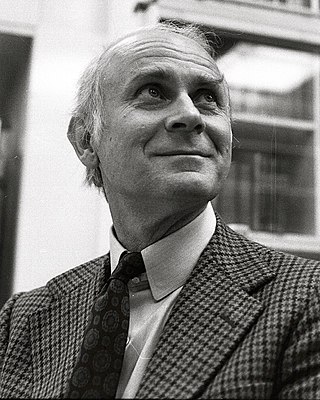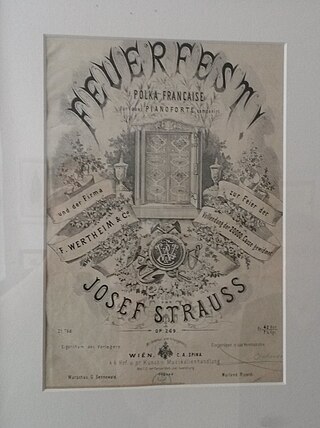Related Research Articles

Bernhard-Viktor Christoph-Carl von Bülow, known as Vicco von Bülow or Loriot, was a German comedian, humorist, cartoonist, film director, actor and writer. As an artist, he was almost exclusively known under his pen name Loriot, which is the french term for the bird oriole depicted as a crest in the coat of arms of the Bülow family.

Reinhard Friedrich Michael Mey is a German Liedermacher. In France he is known as Frédérik Mey.
Paul Godwin (1902–1982) was a violinist and the leader of a popular German dance orchestra in the 1920s and 30s.

Ireen Sheer is a German-English singer. She had a top five hit on the German singles chart with "Goodbye Mama" in 1973. She went on to finish fourth at the Eurovision Song Contest 1974 representing Luxembourg, sixth at the Eurovision Song Contest 1978 representing Germany, and thirteenth at the Eurovision Song Contest 1985 representing Luxembourg again.
Heinz Schubert was a German actor, drama teacher and photographer, best known for playing the role of Alfred Tetzlaff in the German television sitcom Ein Herz und eine Seele.

The Children of Golzow is a documentary by the German filmmaker Winfried Junge that was started in 1961 and lasted until 2007, when the series concluded. The film is a prolonged observation of the lives of several people in the Brandenburg village of Golzow.

Peter Rühmkorf was a German writer who significantly influenced German post-war literature.

Eva Strittmatter was a German writer of poetry, prose, and children's literature.

Theo Lingen, born Franz Theodor Schmitz, was a German actor, film director and screenwriter. He appeared in more than 230 films between 1929 and 1978, and directed 21 films between 1936 and 1960.

German rapper Fler has released 17 studio albums, four mixtapes, one EP, six collaborative albums and 59 singles.

Georg Thomalla was a German actor. He appeared in about one hundred fifty film and television productions between 1939 and 2000 and was widely known in Germany for his comedic roles.
Harich Group was the originally derogatory name given by the East German justice and media establishments to the defendants in a high-profile 1957 criminal trial against a "circle of like minded persons".
Meine Schwester und ich is a musical comedy in two acts with prelude and postlude. Ralph Benatzky composed the music and also wrote the libretto together with Robert Blum. Benatzky based the work on a contemporary comedy by Georges Berr and Louis Verneuil. The work was premiered on 29 March 1930 in Berlin, Germany, at the Theater am Gendarmenmarkt, also known as Komödie.

Feuerfest! ('Fireproof!'), Op. 269, is a polka-française composed by Josef Strauss in 1869.

Christa Luft is a German economist and politician of the SED/PDS. Luft joined the SED in 1958. From 18 November 1989 to 18 March 1990, she was the Minister of Economics in the Modrow government. From 1994 to 2002 she was member of the Bundestag for the PDS.
Der Theatermacher is a play written by Austrian author Thomas Bernhard in 1984.
Heinz Meier was a German actor and theatre director. He was most famous for his appearances in many sketches of popular German comedian Loriot, where he was one of the most common actors alongside Loriot himself and Evelyn Hamann. He also appeared in his two films Ödipussi and Pappa Ante Portas, but only in minor roles.

The Kinderfest in Memmingen has a tradition going back more than 400 years. Every year more than 2000 children from the municipal primary and secondary schools take part in the festival.
"Englische Ansage" is a one-person comedy sketch written by German humorist Loriot. It shows a continuity announcer who summarizes the plot of an English crime series, but fails because of the hard-to-pronounce names. Alternative titles of the sketch are "Inhaltsangabe" (Synopsis) and "Die englische Inhaltsangabe".
References
- 1 2 Loriot. "Der Lottogewinner" (PDF) (in German). Klett. Retrieved 22 August 2019.
- ↑ "Loriot: Episodenliste". Fernsehserien.de (in German). Retrieved 6 August 2019.
- ↑ Rademacher, Daniel (17 February 2010). "Loriots berühmter Lotto-Millionär wird heute 80". Stuttgarter Nachrichten (in German). Retrieved 6 August 2019.
- ↑ Reents, Edo (22 July 2013). "Ein Hauptgewinn der komischen Branche". Faz.net (in German). Retrieved 6 August 2019.
- ↑ Lukschy, p. 54 f.
- ↑ Thomann, Jörg (12 November 2003). "Das große Loriot-Lexikon". Faz.net (in German). Retrieved 7 August 2019.
Mit der Figur des verwirrten Erwin Lindemann gelingt Loriot ein ergreifendes Porträt des modernen Individuums, das sich von seinen Mitmenschen (hier: ein Regisseur) dazu drängen läßt, sich selbst zu verleugnen, und vor lauter Ambitionen (Herrenboutiqe in Wuppertal etc.) die Orientierung verliert – bis es seinen eigenen Namen vergißt.
- ↑ Mayer-Wolk, Eva (1 September 2003). "TV-Darsteller: "Loriot war knallhart"". Der Spiegel (in German). Retrieved 7 August 2019.
Zwei große Fehler hab ich gemacht: Ich hab mein Haus nicht unterkellert, und ich habe Sie den Lindemann spielen lassen.